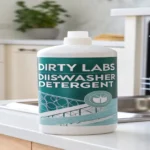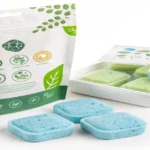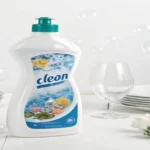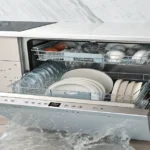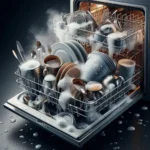I know I am pricing myself to your market based on feedback, honestly we can all relate. You are all set to load the dishwasher and find out that your rinse aid dispenser is empty.
Maybe you’re just trying to be more green and asking yourself if another bottle of chemicals is required.
Whether you’re here because of a bacterial article that made you think twice about your rinse aid, or you want to take up yet another thing but want it to be as effective as possible.
I’m going to present my perspective and experience after years of having thoroughly researched dishwashers without rinse aid, with a focus on practical tips that yield real-world results.
Understanding Rinse Aid: More Than Just Another Cleaning Product
So before we get into the alternatives, let me just explain what rinse aid does (I wish someone had told me this decades ago!) Rinse aid is like an invisible dome.
It intrigued me when I learned how it works, which is the same way that soap breaks down grease – by breaking down the surface tension of water.
To spare you the technobabble, All-Clad has this amazing ability to make water slide off your dishes instead of those little droplets that leave spots everywhere.
I clearly remember the first time I ran out of rinse aid — my glasses came out looking as if they had gone through a rain cycle! It was right about then that I began to dig into the rationale of it all.
Can Your Dishwasher Survive Without Rinse Aid?
The short answer? Yes, absolutely. The long answer? It’s a bit more complicated. I’ve experimented with running my dishwasher both ways and here’s what I’ve noticed:
While your dishes will still get clean without rinse aid, you might face a few challenges:
- Glasses might look a bit cloudy
- Plates could take longer to dry
- You might spot some watermarks, especially if you live in a hard water area
But don’t worry – I’ve got some tricks up my sleeve to help with all of these issues!
The Real Impact of Skipping Rinse Aid
Let me share something from my kitchen experiments. After three months of running my Bosch dishwasher without rinse aid, here’s what I observed:
- Water spots became more noticeable, especially on dark plates and wine glasses
- Drying times increased – I often found water pooling in upturned mugs
- Some plastic containers stayed wet longer
- Glass items needed extra attention
However, it wasn’t all bad news. The actual cleaning performance stayed pretty much the same, and most items still came out perfectly fine.
Natural Alternatives That Work
Through trial and error (and a few memorable disasters), I’ve discovered some effective alternatives to commercial rinse aid. Here’s what worked best for me:
| Alternative | Effectiveness | Cost | Environmental Impact |
|---|---|---|---|
| White Vinegar | 8/10 | Very Low | Minimal |
| Citric Acid Solution | 7/10 | Low | Minimal |
| Lemon Juice | 6/10 | Medium | Minimal |
“After trying various alternatives, I found that a simple vinegar solution works almost as well as commercial rinse aid, though you need to be careful how you use it.” – My personal experience after six months of testing
Smart Strategies for Better Results Without Rinse Aid
Over time, I’ve developed some pretty effective workarounds.
Here’s what makes a difference:
Loading Techniques That Matter
- Angle your dishes at about 45 degrees
- Leave space between items
- Place cups and bowls at a slight tilt
Temperature Tricks
- Use the hottest water setting available
- Enable the heated dry option
- Run the hot water tap before starting the dishwasher
Maintenance: The Secret to Spotless Dishes
I learned this the hard way – proper maintenance becomes even more crucial when you’re not using rinse aid.
Here’s my monthly routine:
- Clean the filter (you’d be amazed at what gets trapped in there!)
- Wipe down the door seals
- Check and clean spray arms
- Run an empty cycle with dishwasher cleaner
Dealing with Hard Water Issues
Living in an area with hard water? I feel your pain! Here’s what helped me:
- Install a water softener if possible
- Use extra detergent (but not too much!)
- Consider using citric acid occasionally
- Wipe glasses immediately after the cycle ends
Special Situations and Solutions
When to Consider Using Rinse Aid
- During humid weather
- For special occasions when glasses need to shine
- When washing lots of plastic items
- If you have particularly hard water
Tips for Different Types of Loads
Based on my experience with different types of dishes:
Everyday Dishes:
- Standard wash cycle
- Regular detergent
- Quick wipe-down if needed
Fine China and Crystal:
- Gentle cycle
- Extra care with placement
- Hand-dry immediately

Alternative Solutions and Tips
Many people successfully use vinegar instead of commercial rinse aid products. When using this alternative, pay attention to how your dishes dry and whether they achieve that spot-free finish you’re looking for.
The drying cycle effectiveness can vary depending on your dishwasher’s heating element and whether you use the air dry option.
For optimal results with any method, ensure your dishwasher detergent goes into the correct dispenser and that you’re not using an alkaline-heavy product that might interfere with the drying process.
Common Issues and Troubleshooting
If your dishes come out wet or you notice rainbow streaks, you might need to check around the compartment for proper dispensing.
Excess rinse aid can cause problems, so it’s important to avoid overfill situations. The amount of rinse aid used can be adjusted – most modern appliances like Samsung dishwasher and Haier models allow you to change the settings based on your needs.
If you’re experiencing spillage or seeing bits of food remaining, ensure the gasket around the rinse aid compartment is intact and working properly.
Maintenance and Best Practices
To maintain optimal performance of your dishwasher, regularly check around the compartment and wipe any excess product.
This helps prevent buildup and ensures proper dispensing of both detergent and rinse aid.
If you have soft water, you might need less rinse aid than recommended, so don’t hesitate to adjust the settings for your specific situation.
Remember that even if you use the best products, proper loading of plates and cutlery is essential for achieving the best results.
Frequently Asked Questions (From Real Users)
Q: Will skipping rinse aid damage my dishwasher?
A: No, I’ve been doing it for months with no issues. The dishwasher functions perfectly fine without it.
Q: How can I prevent water spots without rinse aid?
A: I’ve found that adding a cup of vinegar to the top rack during the final rinse works wonders.
Q: Does the type of detergent matter more when not using rinse aid?
A: Yes! I noticed better results with high-quality detergent pods that include glass protection.
Essential Tips to Remember
After months of testing and adjusting, here are my top takeaways:
- Load Smart: Proper angling is crucial for water drainage
- Use Hot Water: Higher temperatures improve drying
- Regular Maintenance: Clean filters and spray arms monthly
- Immediate Action: Open the door slightly when the cycle ends
- Adapt Methods: Different seasons may require different approaches
The Bottom Line
Running your dishwasher without a rinse aid is doable. While it might require some adjustments to your routine, the benefits can include cost savings and fewer chemicals in your home.
The key is finding the right balance of techniques and alternatives that work for your specific situation.
Remember, there’s no one-size-fits-all solution. What works in my kitchen might need tweaking in yours. Don’t be afraid to experiment with different methods until you find your perfect combination.
Pro Tips for Success
- Keep a cleaning schedule
- Monitor results and adjust as needed
- Consider seasonal changes
- Listen to your dishwasher (unusual sounds might indicate problems)
- Trust your experience and observations
Conclusion
The journey to rinse-aid-free dishwashing might take some trial and error, but with these tips and a bit of patience, you can achieve great results.
Keep in mind that every dishwasher is different, and what works for one might not work for another.
The key is to be observant and willing to adjust your approach based on results.

I’m Ian Welkins, a seasoned professional in the kitchen industry. My passion now drives me to provide invaluable insights into the world of top-notch kitchen products. With years of hands-on experience, I’m your go-to source for culinary excellence.


